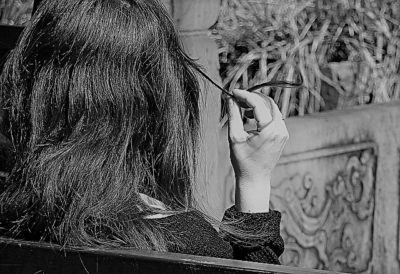by Vani Viswanathan
A few months into 2018, I realised that my mind had practically dried up when it came to creative writing. The ideas that did come all fizzled out- there were multiple drafts in notebooks, on my laptop and my blog, weak attempts at trying to translate the few thoughts that would come to mind. Creatively, I wasn’t going anywhere: non-fiction, which was relatively easier earlier, was also getting tough; fiction had to be ruled out altogether.
Around the same time, I also realised that my mind became more and more obsessed with productivity. Exactly what productivity meant to me, I couldn’t – and still can’t – really define. But I was constantly looking for ways to improve how I spent my time. I’ve written earlier about how I love being organised, so trying to be more productive seemed a natural next step. I looked for apps that helped turn being organised into being productive; looked at bullet journal templates, and while I didn’t read books on the subject, I looked for pop science and people’s experiences on how they managed to be more productive.
Two things helped me take a step back. One was when I noticed that I couldn’t spend even a few minutes in the morning meditating without thinking of what should go into my to-do list for the day – something which may have made me feel very productive (because I do end up finishing tasks that are on my task list, most of the time). The other came from a podcast ‘The Ezra Klein Show’, recommended here by someone I know, who it seems, was struggling with similar issues. In this podcast, the host talked to Chris Bailey – the author of Hyperfocus – who mentioned that we have pretty much trained our minds to be stimulated all the time, and in some sense, that we have come to learn that being bored is bad. That’s why we automatically look for our phones if we’re left alone at the restaurant table for a few minutes; we can’t stand a minute or two of not being engaged!
Something else that Bailey mentioned got me thinking: that when it comes to being productive – or creative – letting the mind wander is equally important. Suddenly it seemed to fall into place! I’d been piling up activities throughout the day, leaving no time unutilised. In the name of being productive, I had essentially removed any time to daydream or to simply be.
What amused me was that my idea of productivity wasn’t only related to work, either professional or personal. I was slotting in time, consciously or unconsciously, for so many other things: to watch episodes of online series, to read books, to waste time on social media. Metro commutes were reserved for listening to podcasts or to music or to finish the last few pages of a book I’d been reading.
No wonder, then, that I couldn’t imagine up stories or write much about anything other than what was going on in my head! I had no mind space to pay attention to anything that didn’t give me something in return. I had no time to get bored – it was almost as if I was scared of being bored.
I started thinking if this was what adulting was about. Where you moved from one task to another, only taking a break to plan your next task. I found it alarming because, for all intents and purposes, I lived a life without very demanding personal commitments. And it wasn’t like people with kids or aged parents to look after never had literary pursuits, was it?
I wondered if my solution was to go back to my productivity-obsessed self and slot in time to write every single day, no matter where I was or what I would come up with. This is something many writers say they do – to make writing also something to be practised and not (only) based on a bout of inspiration. RK Narayan, whose house I recently visited, had said ‘You become a writer by writing. It is a yoga.’ Could that be it?
But also, for the practice itself to be fulfilling, did I also need some time to loiter, observe, engage, all without a purpose? Because I was appalled that as someone who travels frequently and enjoys seeing different types of people, cultures and environments, I couldn’t find enough to write about.
I am a writer who thrives on what I see outside; ideas from what I see are internalised, sprinkled with characteristics that are similar to mine or those of others I know, and then written out. This, then, emphasises to me the importance of letting my mind wander. Without purpose.
It’s easier said than done, though. In a world built to distract, it takes phenomenal effort to unlearn the pleasures of constant connectivity: the wealth of knowledge you get about people and things that matter, and the idea of being ‘in touch’. In a world where you can access thoughts of all those who choose to put it out, it’s tough to not be overwhelmed by what everyone else seems to be doing, and doing right, and how you could also be one of them – if only you managed to read more, speak more, and generally be ‘out there’ more. I especially find it difficult to not feel demotivated when I see people on Twitter seemingly managing personal and professional lives so well, apparently thriving on both fronts. I know, when I look at it rationally, that I only see what they choose to share, and the fights, struggle and self-doubt behind their wonderful work isn’t for all of us to see. But just how rational can we always be?
Thankfully, though, I’ve had some help figuring out how to step back from the productivity madness, from friends, family and people I don’t know, who have done the hard work and graciously shared it with others so we can see if it works for ourselves. Funnily enough, a show I’ve been recently been hooked on to, Downton Abbey, also got me thinking, especially after I heard a few podcasts. I felt that the analogue world doesn’t deprive us of much; if anything, it makes for more meaningful, deeper experiences. If getting news only through telegrams or newspapers that arrived the next morning didn’t really kill humankind a few decades ago, surely I could afford to spend time doing nothing, instead of checking email, Twitter or WhatsApp? Or without supplementing my walks or chores, such as laundry or fetching groceries, with ‘entertainment’ – be it music or podcasts? Dare I let my mind wander during these times?
It sounds possible. I’ve yet to figure out how to do this well given that professionally, as a communications specialist, I need to stay abreast of news, views and ways to share these. But it’s possible, I think: I was surprised when I heard the author of Deep Work, Cal Newport, share that he gets his news only from newspapers and he’s not on any social media – and he works in a space where he needs to stay on top of things and have his work be promoted to reach more people! Maybe I have to tap into that part of my self that loves productivity tools and slot time for doing nothing – and hope that I stick to it and find time periodically to get bored.
So, I’m not one for giving myself tangible new year’s resolutions, but this is simple enough, and one that I’m sure will bring me happiness if I get it right: to be bold enough to get bored. Let’s see if months down the line, I find ideas and words coming back.






